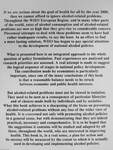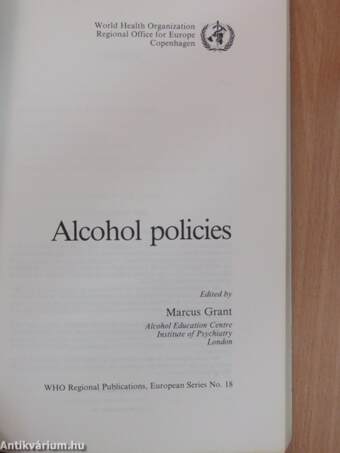1.118.450
kiadvánnyal nyújtjuk Magyarország legnagyobb antikvár könyv-kínálatát
Alcohol Policies
| Kiadó: | World Health Organization |
|---|---|
| Kiadás helye: | Genf |
| Kiadás éve: | |
| Kötés típusa: | Ragasztott papírkötés |
| Oldalszám: | 153 oldal |
| Sorozatcím: | WHO Regional Publications, European Series |
| Kötetszám: | 18 |
| Nyelv: | Angol |
| Méret: | 24 cm x 16 cm |
| ISBN: | 92-890-1109-2 |
| Megjegyzés: | További kapcsolódó személyek a kötetben. |
naponta értesítjük a beérkező friss
kiadványokról
naponta értesítjük a beérkező friss
kiadványokról
Fülszöveg
If we are serious about the goal of health for all by the year 2000,
then we cannot afford to ignore alcohol-related problems.
Throughout the WHO European Region, and in many other parts
of the world, rates of alcohol consumption and of alcohol-related
problems are now so high that they give rise to considerable concern.
Piecemeal attempts to deal with these problems seem to have had
rather inadequate results, to say the least. In an effort to find
a more lasting solution, WHO has begun to pay special attention
to the development of national alcohol policies.
What is presented here is an integrated approach to the whole
question of policy formulation. Past experiences are analysed and
research priorities are assessed. A real attempt is made to suggest
the logical sequence of stages in national policy development.
The contribution made by economists is particularly
important, since one of the many conclusions of this book
is that a reasonable balance needs to be... Tovább
Fülszöveg
If we are serious about the goal of health for all by the year 2000,
then we cannot afford to ignore alcohol-related problems.
Throughout the WHO European Region, and in many other parts
of the world, rates of alcohol consumption and of alcohol-related
problems are now so high that they give rise to considerable concern.
Piecemeal attempts to deal with these problems seem to have had
rather inadequate results, to say the least. In an effort to find
a more lasting solution, WHO has begun to pay special attention
to the development of national alcohol policies.
What is presented here is an integrated approach to the whole
question of policy formulation. Past experiences are analysed and
research priorities are assessed. A real attempt is made to suggest
the logical sequence of stages in national policy development.
The contribution made by economists is particularly
important, since one of the many conclusions of this book
is that a reasonable balance needs to be struck
between economic and public health interests.
But alcohol-related problems must not be viewed in isolation.
They need to be seen as a consequence of particular lifestyles
and of choices made both by individuals and by societies.
What this book achieves is a sharpening of the focus on preventing
alcohol-related problems without any loss of the wider view of
health. It is concerned not only with promoting alcohol policies
in a general sense, but with demonstrating that they are indeed
practical, necessary and comprehensive. It is to be hoped that
the suggestions it contains will be studied and adapted by all
those, throughout the world, who are interested in improving
health. This book is, in a real sense, a plan for action and
its success will be measured by the extent to which it is actually
used in developing and implementing alcohol policies. Vissza
Témakörök
- Szociológia > Beilleszkedési zavarok > Alkoholizmus
- Idegennyelv > Idegennyelvű könyvek > Angol > Orvostudomány
- Idegennyelv > Idegennyelvű könyvek > Angol > Szociológia > Beilleszkedési zavarok > Alkoholizmus
- Orvostudomány > Általános orvosi, egyéb > Idegennyelvű
- Orvostudomány > Orvosi idegennyelvű könyvek > Általános orvosi
- Orvostudomány > Orvosi idegennyelvű könyvek > Szenvedélybetegségek
- Orvostudomány > Szenvedélybetegségek > Alkohol
- Orvostudomány > Szenvedélybetegségek > Idegennyelvű
- Szociológia > Szociálpolitika > Egyéb
- Idegennyelv > Idegennyelvű könyvek > Angol > Szociológia > Szociálpolitika > Egyéb
- Orvostudomány > Általános orvosi, egyéb > Egészségügy














